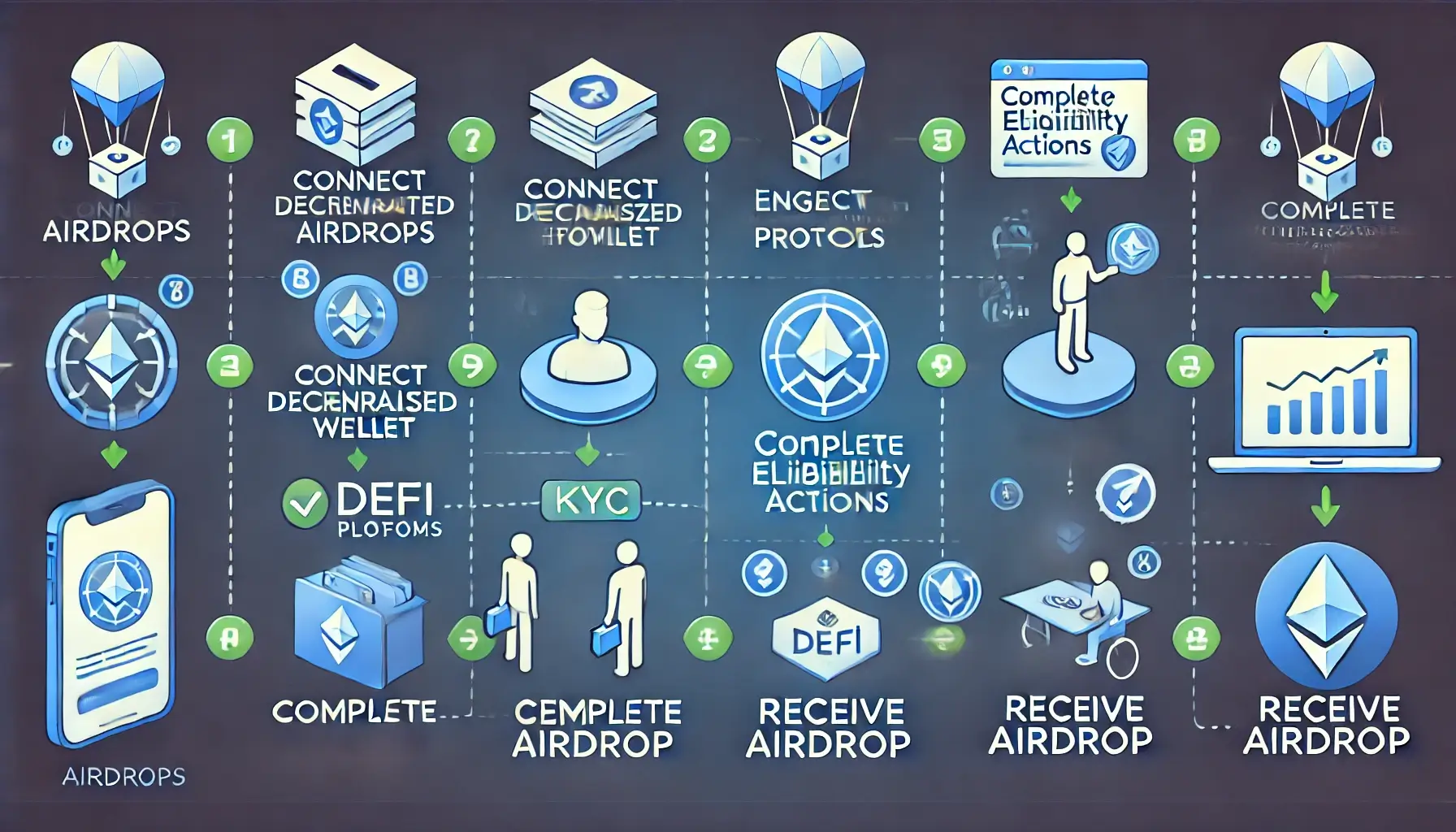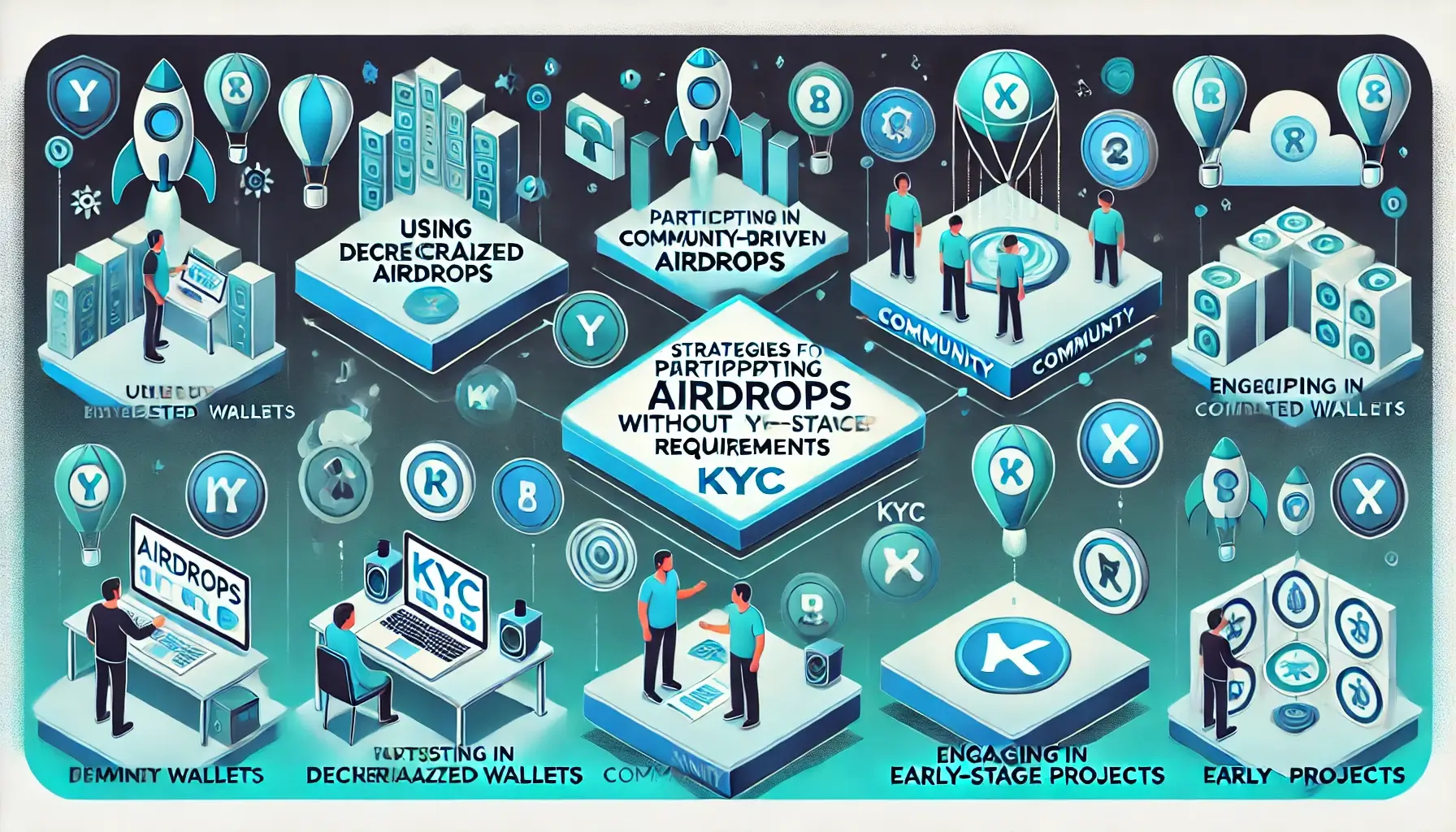In the world of cryptocurrency, airdrops are an exciting way to earn free tokens. However, as regulations tighten, many airdrop campaigns now require Know Your Customer (KYC) verification a process where participants must disclose personal information such as identity documents and proof of address. While KYC is intended to prevent fraud and comply with legal standards, it also raises privacy concerns for users who prefer to remain anonymous.
Fortunately, there are still ways to participate in airdrops without KYC requirements. In this guide, we’ll explore strategies for joining KYC-free airdrops, tips on finding these opportunities, and essential considerations to ensure you participate safely.
1. What Are KYC-Free Airdrops?
KYC-free airdrops, also known as no-KYC airdrops, are token distribution events where participants are not required to complete identity verification. Instead of collecting personal information, these airdrops often use basic criteria, such as holding a particular cryptocurrency or interacting with the project’s platform, to qualify users for token rewards.
For privacy-conscious users, KYC-free airdrops offer a way to earn rewards while keeping their personal information secure. However, finding these airdrops can be challenging, as regulatory pressures push more projects to enforce KYC.
2. Why Some Airdrops Require KYC and Others Don’t
The main reason for KYC in airdrops is regulatory compliance. Many countries require companies distributing tokens to verify the identities of participants to prevent illegal activities, including money laundering, fraud, and terrorist financing. KYC helps ensure that tokens are only distributed to legitimate users.
However, some projects choose not to require KYC because they aim to maintain a decentralized and privacy-friendly model. For example:
- Decentralized Autonomous Organizations (DAOs): Some DAOs and blockchain projects prioritize privacy and do not impose KYC requirements, as they believe it conflicts with the principles of decentralization.
- Community-Building Airdrops: Projects focused on community growth may prefer to conduct airdrops without KYC to encourage broader participation and make it easier for anyone to join.
3. How to Find Airdrops Without KYC Requirements
Finding KYC-free airdrops requires some research, as most high-profile projects tend to implement KYC. Here are strategies to help you discover no-KYC airdrops:
3.1 Join Crypto Airdrop Aggregator Platforms
Airdrop aggregator websites compile lists of ongoing and upcoming airdrops. Some of these platforms provide filters to help you find airdrops without KYC requirements. Popular aggregators include:
- Airdrops.io: Lists active airdrops and labels campaigns as “KYC” or “No-KYC” for easy navigation.
- CoinMarketCap Airdrops: This platform occasionally features no-KYC airdrops. Be sure to read each airdrop’s requirements for KYC information.
- AirdropAlert.com: Another aggregator that categorizes airdrops by KYC requirements, making it easier to find privacy-friendly options.
3.2 Follow Projects on Social Media and Crypto Communities
Many airdrops, especially those hosted by new or smaller projects, are promoted directly on social media. Following projects on Twitter, Telegram, and Discord can help you stay updated on upcoming airdrops, including those that don’t require KYC. These platforms often announce details about their airdrops, including any requirements for participation.
3.3 Participate in Decentralized Finance (DeFi) Protocols
Some DeFi projects reward early users with retroactive airdrops—tokens distributed to users who interacted with the platform before a specific date. Many of these airdrops do not require KYC, as they’re based on user activity rather than sign-ups. Examples of popular DeFi protocols that have conducted KYC-free airdrops include:
- Uniswap (UNI): Uniswap airdropped UNI tokens to users who had previously used the decentralized exchange, with no KYC needed.
- 1inch (1INCH): 1inch, a decentralized exchange aggregator, rewarded early users with an airdrop without KYC requirements.
These retroactive airdrops are generally based on blockchain interactions, making them a safer and more private option for crypto enthusiasts.

4. Strategies for Participating in No-KYC Airdrops
Once you’ve identified KYC-free airdrops, here are some strategies to maximize your rewards and participate safely:
4.1 Use Multiple Wallets
Creating multiple wallets allows you to increase your chances of receiving larger allocations without violating any terms, provided the project does not impose strict one-wallet-per-person rules. Some platforms, especially those on Ethereum or Binance Smart Chain, allow users to connect multiple wallets to qualify for airdrops.
Example: If a project rewards wallet holders based on token amounts, you could distribute your holdings across multiple wallets to maximize your airdrop eligibility.
4.2 Engage with Project Ecosystems
Many no-KYC airdrops reward participants who actively engage with the project’s ecosystem. Actions such as staking, providing liquidity, or holding tokens can qualify users for airdrops. Engaging with DeFi platforms and NFTs can often lead to surprise airdrops.
Example: Early users of protocols like Aave or Compound were rewarded with governance tokens for providing liquidity or borrowing assets. These tokens could then be traded or held for potential value growth.
4.3 Look Out for Retroactive Airdrops
As mentioned, retroactive airdrops reward users based on past activities. Regularly interacting with DeFi platforms, decentralized exchanges, and NFT marketplaces without expecting immediate rewards may pay off with unexpected airdrops.
Example: DeFi platforms like dYdX and ParaSwap conducted retroactive airdrops to users who met specific usage criteria, rewarding those who had used their services consistently.
4.4 Participate in Testnets
Some projects use testnet participation as an eligibility criterion for airdrops. Testnets are trial versions of blockchain networks, allowing users to test features without risking real assets. Many projects incentivize testnet participation with airdrops, and these usually don’t require KYC.
Example: Projects like Optimism and Arbitrum rewarded users who interacted with their testnets, helping them stress-test their Layer 2 solutions and rewarding participants without requiring KYC.
5. Risks and Considerations When Participating in No-KYC Airdrops
While KYC-free airdrops offer privacy advantages, it’s essential to be cautious. Here are some things to watch out for:
5.1 Watch Out for Scams
Scam airdrops are common in the crypto space. Fraudsters may use fake airdrop offers to steal users’ funds or personal information. Always verify the legitimacy of a project before participating by checking its official website, social media channels, and reputable sources like CoinMarketCap or CoinGecko.
5.2 Avoid High Gas Fees
Some airdrops, especially those on the Ethereum network, may involve high gas fees for claiming tokens. Be mindful of the transaction costs and assess whether the value of the airdrop justifies the expense.
5.3 Stay Informed About Token Value
Not all airdrops lead to valuable tokens. Some projects may distribute tokens that have little to no liquidity, making it difficult to sell or trade them. Research the project’s roadmap and community to gauge its potential before investing time in a no-KYC airdrop.
6. Examples of Successful KYC-Free Airdrops
Several projects have run successful no-KYC airdrops, distributing tokens to users while respecting their privacy. Here are two notable examples:
6.1 Uniswap (UNI) Airdrop
In 2020, Uniswap distributed its UNI governance token to users who had previously used the platform, without requiring KYC. This airdrop rewarded thousands of early adopters and helped establish UNI as one of the most prominent DeFi tokens.
6.2 dYdX (DYDX) Airdrop
The dYdX decentralized exchange also airdropped its governance token, DYDX, to active users. This retroactive airdrop rewarded loyal users without asking for any personal information, exemplifying how DeFi projects can distribute tokens while maintaining user privacy.
Conclusion
Participating in airdrops without KYC requirements is an excellent way for crypto enthusiasts to earn rewards while safeguarding their privacy. By using strategies such as engaging with DeFi platforms, leveraging multiple wallets, and monitoring retroactive airdrops, you can maximize your opportunities in the crypto space without compromising anonymity.
As the industry grows and more privacy-focused projects emerge, KYC-free airdrops will continue to be a valuable tool for rewarding early adopters and building strong, decentralized communities.
For more insights and detailed guides on blockchain applications, visit our Blockchain Technology Guides.
Stay Updated
For the latest updates on KYC-free airdrops, crypto trends, and blockchain developments, follow us on:
Stay informed with the latest strategies and insights in the world of cryptocurrency at FreeCoins24.io.
Special Offer
Looking to trade tokens in decentralized insurance protocols? Sign up on Bybit today and enjoy up to $30,000 in deposit bonuses. Trade confidently on a platform built for crypto enthusiasts.
















